Overview
This article delves into the advantages and disadvantages of using mulch versus rock in luxury landscaping. The choice between these two materials hinges on aesthetic preferences, maintenance needs, and environmental conditions.
- Mulch, for instance, enhances soil health and moisture retention,
- while rock provides durability and requires minimal upkeep.
By understanding these features, homeowners can make informed decisions that align with their landscaping goals, ultimately enriching their outdoor spaces and property value. Have you considered how these options could transform your own landscape?
Introduction
In the realm of luxury landscaping, the choice between mulch and rock can significantly influence both aesthetics and functionality. Mulch, characterized by its organic roots, offers features such as moisture retention and soil enrichment. These advantages make it a staple for vibrant gardens, enhancing the overall health of the landscape.
Conversely, rock stands out for its durability and low maintenance, appealing to homeowners who seek a polished, long-lasting look for their outdoor spaces. As these materials serve distinct purposes, the pressing question arises: how does one navigate the balance between the lush, nurturing qualities of mulch and the steadfast elegance of rock to create a truly luxurious outdoor space?
This consideration not only impacts the visual appeal but also enhances the homeowner’s lifestyle and property value.
Understanding Mulch and Rock in Landscaping
In landscaping, mulch versus rock are two prevalent materials, each serving distinct purposes. Mulch, often sourced from organic materials such as wood chips, bark, or straw, is primarily valued for its ability to retain soil moisture, suppress weeds, and enhance soil health through decomposition. It is particularly favored for flower beds and around newly planted trees, as it promotes plant growth and reduces soil erosion. However, this organic ground cover requires regular upkeep, typically needing replacement every 1-2 years, which can be a consideration for homeowners seeking low-maintenance solutions.
In contrast, stone—comprising materials like gravel, river stones, and decorative pebbles—is chosen for its durability, low maintenance, and aesthetic versatility. Stones are less susceptible to environmental damage, effectively withstanding severe weather conditions, making them ideal for enduring tough climates. They represent a long-term investment, as they rarely need replacement and can last over a decade without degrading. Additionally, stones efficiently inhibit weed growth and provide a polished appearance that enhances the overall aesthetic of outdoor spaces.
As we approach 2025, the decision of mulch versus rock is influenced by factors such as cost, maintenance requirements, and visual preferences. While organic materials are generally more economical for covering larger areas, stones can be perceived as a premium choice that elevates the aesthetic appeal of upscale landscapes. For instance, projects incorporating stone often highlight its resilience against strong winds and its ability to maintain a tidy appearance with minimal effort.
Case studies indicate that while organic coverings offer nutritional benefits to the soil, stones provide a more durable option that aligns with the desires of homeowners seeking longevity and minimal upkeep. Notably, stones seldom require replacement and can endure for more than ten years without deteriorating, reinforcing their position as a lasting solution. Ultimately, understanding the key distinctions between mulch versus rock is essential for creating luxurious outdoor spaces that reflect personal styles and practical needs, with mulch offering aesthetic flexibility and rock delivering stability and low maintenance.
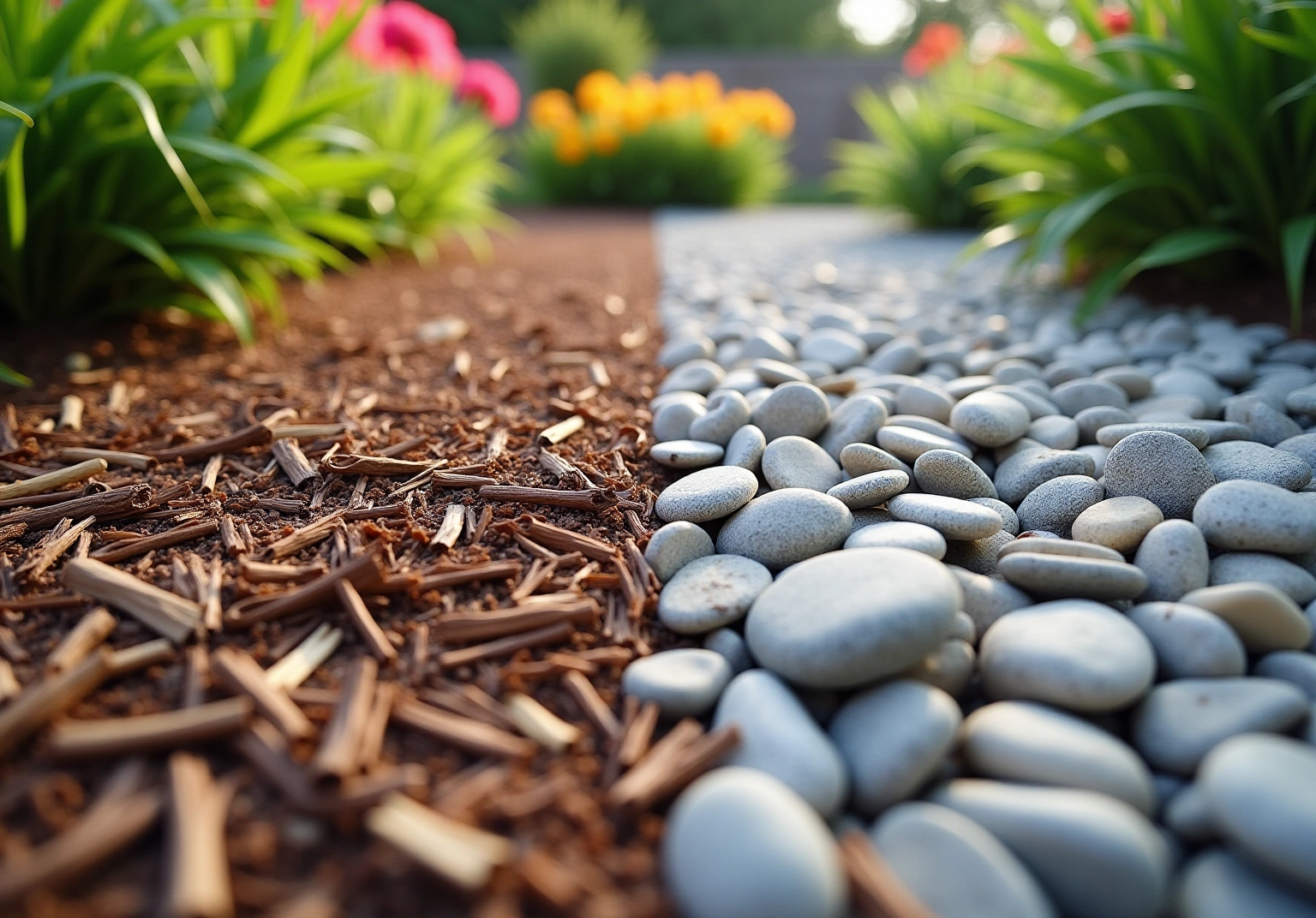
Advantages of Mulch for Luxury Landscapes
Mulch offers a multitude of advantages, making it an excellent choice for luxury landscapes, particularly when crafted by experts like Grow Landscapes. One notable feature is its ability to enhance the visual appeal of gardens through a rich, textured ground cover that beautifully complements diverse plantings. This not only elevates the aesthetic but also contributes to property value and curb appeal, which are crucial for discerning homeowners. Moreover, ground cover is essential for retaining soil moisture, thereby reducing the frequency of watering—an important consideration for maintaining the health of high-value plants.
In addition to moisture retention, mulch inhibits weed growth, significantly reducing maintenance efforts. This allows homeowners to relish their outdoor spaces without the burden of constant upkeep. As organic mulch decomposes, it enriches the soil, enhancing its structure and fertility, which promotes healthier plant growth. In luxury landscapes, where aesthetics and plant vitality are paramount, organic material becomes an indispensable element in creating a stunning outdoor environment.
Grow Landscapes further amplifies these benefits by integrating thoughtful design elements such as strategic lighting and comfortable seating areas, which elevate the overall appeal of the landscape. Homeowners have the option to choose from materials like cedar mulch and recycled mulch, ensuring they select the best fit for their gardening needs. This thoughtful selection guarantees both functional and aesthetic advantages, enhancing the beauty and enjoyment of their outdoor living spaces.
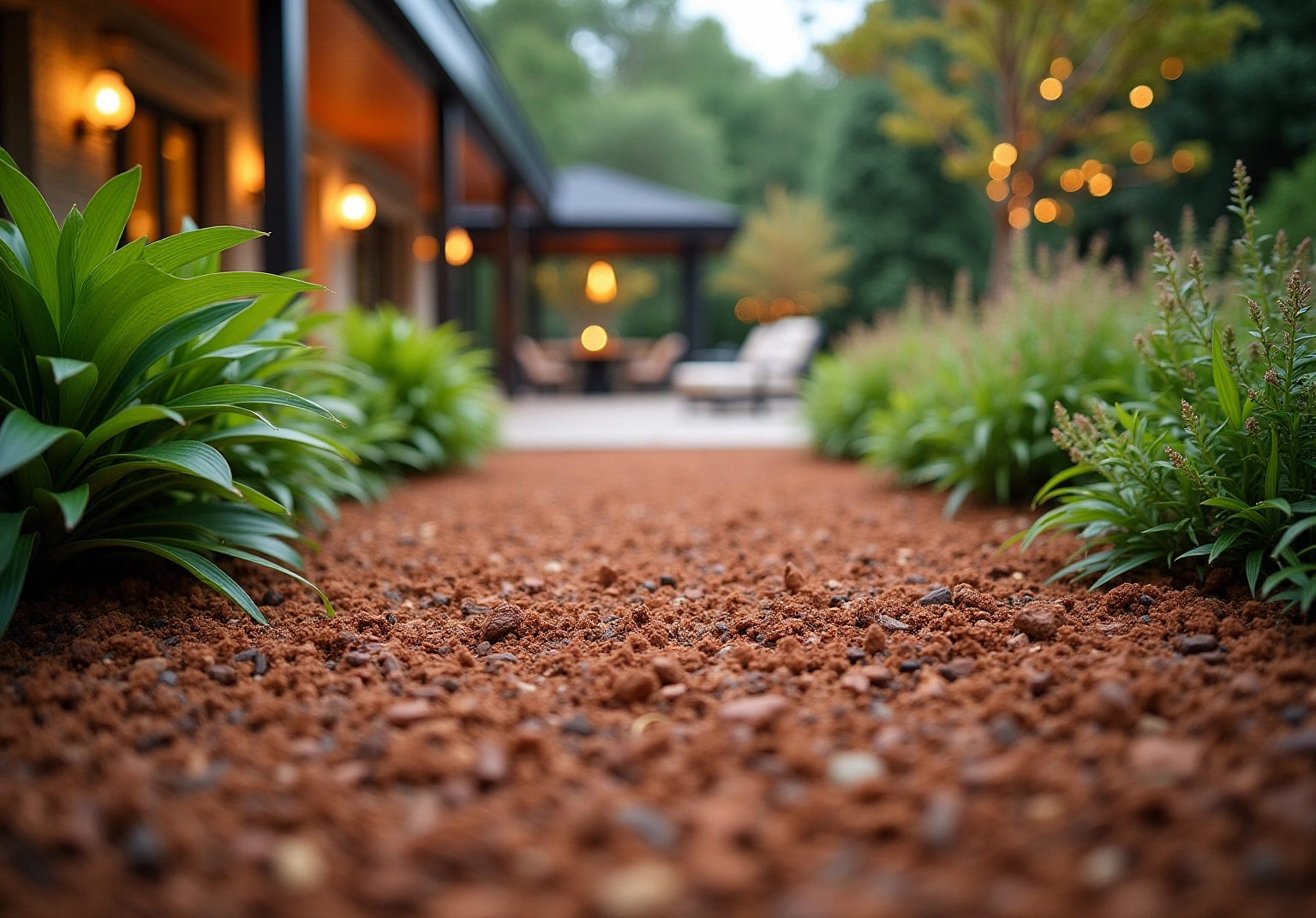
Benefits of Rock in High-End Landscaping
Rock is a highly sought-after material in high-end landscaping due to its numerous benefits. Its main benefit resides in its remarkable durability; unlike organic substances, stone does not decay, guaranteeing a long-lasting solution that requires minimal upkeep. This feature is particularly attractive to luxury homeowners who prioritize a pristine appearance without the burden of frequent maintenance. Furthermore, stone excels in controlling erosion and managing drainage, making it ideal for diverse landscape designs, including slopes and water features.
Visually, stone presents a wide range of hues, dimensions, and surfaces, offering abundant creative design possibilities that enhance the beauty of any property. Its modern, clean look complements contemporary architectural styles, making it a perfect fit for luxury landscapes. For instance, crushed granite not only enhances visual appeal but also promotes excellent drainage, ensuring a healthy garden environment.
Moreover, the durability of geological materials results in cost-effectiveness over time, as they do not need frequent replenishment like mulch. This aspect is crucial for property owners seeking to invest in sustainable outdoor design solutions. Case studies have demonstrated that properties employing stone landscaping can achieve substantial returns on investment, further solidifying its status as a favored option in luxury outdoor areas.
At Grow Landscapes, our intricately detailed 3D design renderings enable homeowners to envision how stony features can be incorporated into their landscapes, improving both functionality and aesthetics. The considerate application of color, texture, and scale in our designs enhances layers of visual intrigue, while strategically positioned stones guide the gaze through the area, promoting exploration and pleasure.
Pros of Using Rock:
- Exceptional durability and low maintenance
- Effective erosion control and drainage management
- Aesthetic versatility with various colors, sizes, and textures
- Cost-effective over time due to longevity
Cons of Using Rock:
- Potential for weed growth over time, requiring additional maintenance
- Can absorb heat, which may affect nearby plants in warmer climates
Ultimately, the combination of durability, low maintenance, and aesthetic versatility makes rock an indispensable element in high-end landscaping projects. However, it is important to consider potential drawbacks, such as the challenge of weed growth over time, which may require additional maintenance. Furthermore, while stones can absorb heat, they also possess reflective qualities that can aid plants in cooler climates, offering a nuanced perspective on their application in landscaping.
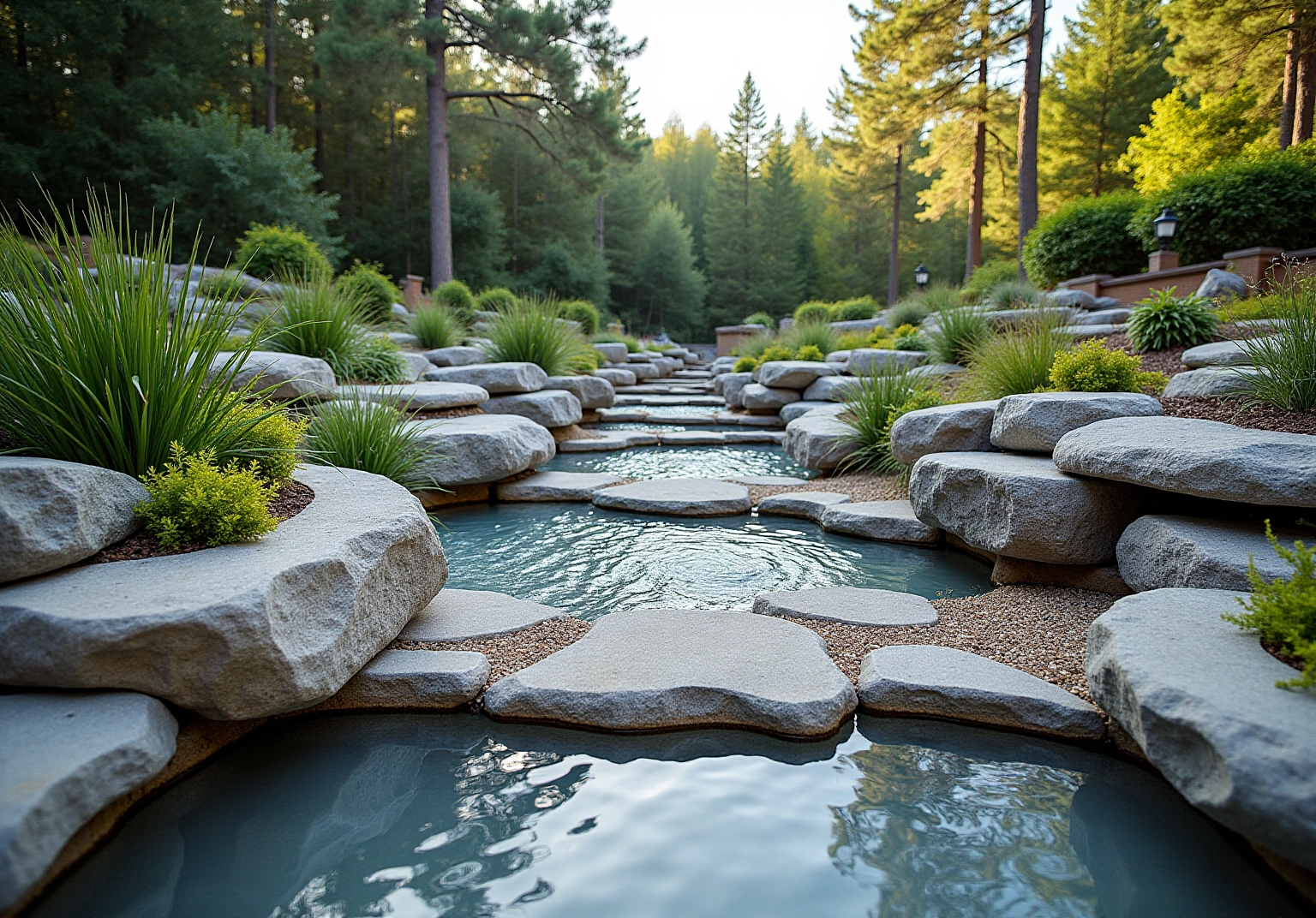
Disadvantages of Mulch and Rock: A Balanced Perspective
While both mulch versus rock provide distinct features, they also present significant drawbacks that homeowners must consider.
- Organic mulch, for instance, requires regular replenishment due to decomposition, which leads to increased maintenance efforts and costs.
- Bulk material typically costs around $30-$40 per cubic yard, while bagged material averages about $67.50 per cubic yard, making bulk options a more cost-effective choice for larger projects.
- Additionally, organic ground cover can attract pests and may need to be replaced more frequently in areas with heavy rainfall or severe weather.
- Conversely, stone can pose challenges such as heat retention, potentially straining nearby plants during warm weather.
- The initial investment for stone may exceed that of ground cover, and its installation often necessitates professional expertise to ensure proper drainage and aesthetic appeal.
- Furthermore, bagged organic material contributes to environmental waste due to plastic packaging, a crucial consideration for eco-conscious residents.
Recognizing these disadvantages, along with insights from case studies on the limitations of both mulch versus rock, is vital for homeowners to evaluate the long-term effects of their design choices, particularly when striving to create luxurious outdoor spaces.
Have you considered how these factors might impact your own outdoor environment?
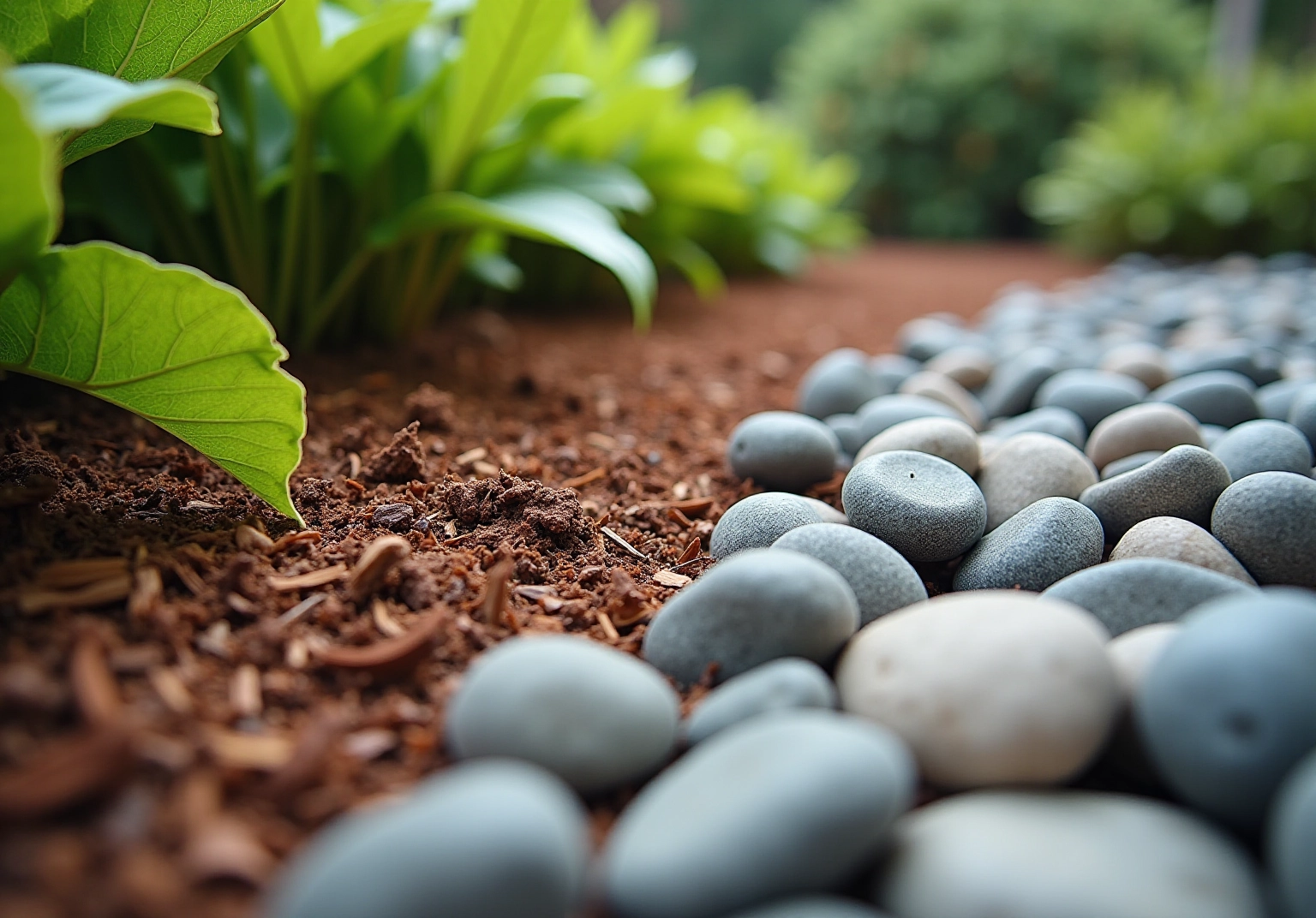
Choosing the Right Material for Your Luxury Landscape
Selecting the appropriate material for luxury landscaping necessitates careful consideration of various factors, such as aesthetic preferences, maintenance demands, and environmental conditions. Homeowners should assess the overall design of their outdoor space and how each material complements existing features. For example, if a lush, vibrant garden is desired, the discussion of mulch versus rock often reveals that mulch is the superior choice due to its moisture-retaining properties and its ability to enrich the soil, thereby enhancing plant health and vibrancy. Conversely, for those pursuing a low-maintenance, contemporary aesthetic, when considering mulch versus rock, decorative stones like Mystic stones or Arctic Pebbles may be more suitable, offering durability and requiring minimal upkeep.
Local climate conditions significantly influence this decision-making process. In regions prone to substantial precipitation, stone arrangements can effectively mitigate soil erosion, providing a robust base that withstands the elements. In contrast, in drier climates, ground cover can be beneficial for its moisture retention capabilities, helping to sustain plant life while reducing irrigation needs.
Statistics indicate that property owners increasingly favor low-maintenance options, with many opting for rock features to lessen upkeep and enhance property value. For instance, communities that utilize organic matter have reported notable water conservation, with usage reductions of 20-25%, underscoring its effectiveness in promoting sustainable landscaping practices. However, it is essential to recognize that ground cover requires regular replacement and may attract pests, which could be a consideration for some homeowners.
Ultimately, the decision of mulch versus rock should reflect the homeowner’s lifestyle, aesthetic aspirations, and the specific needs of their landscape, ensuring a harmonious blend of beauty and functionality.
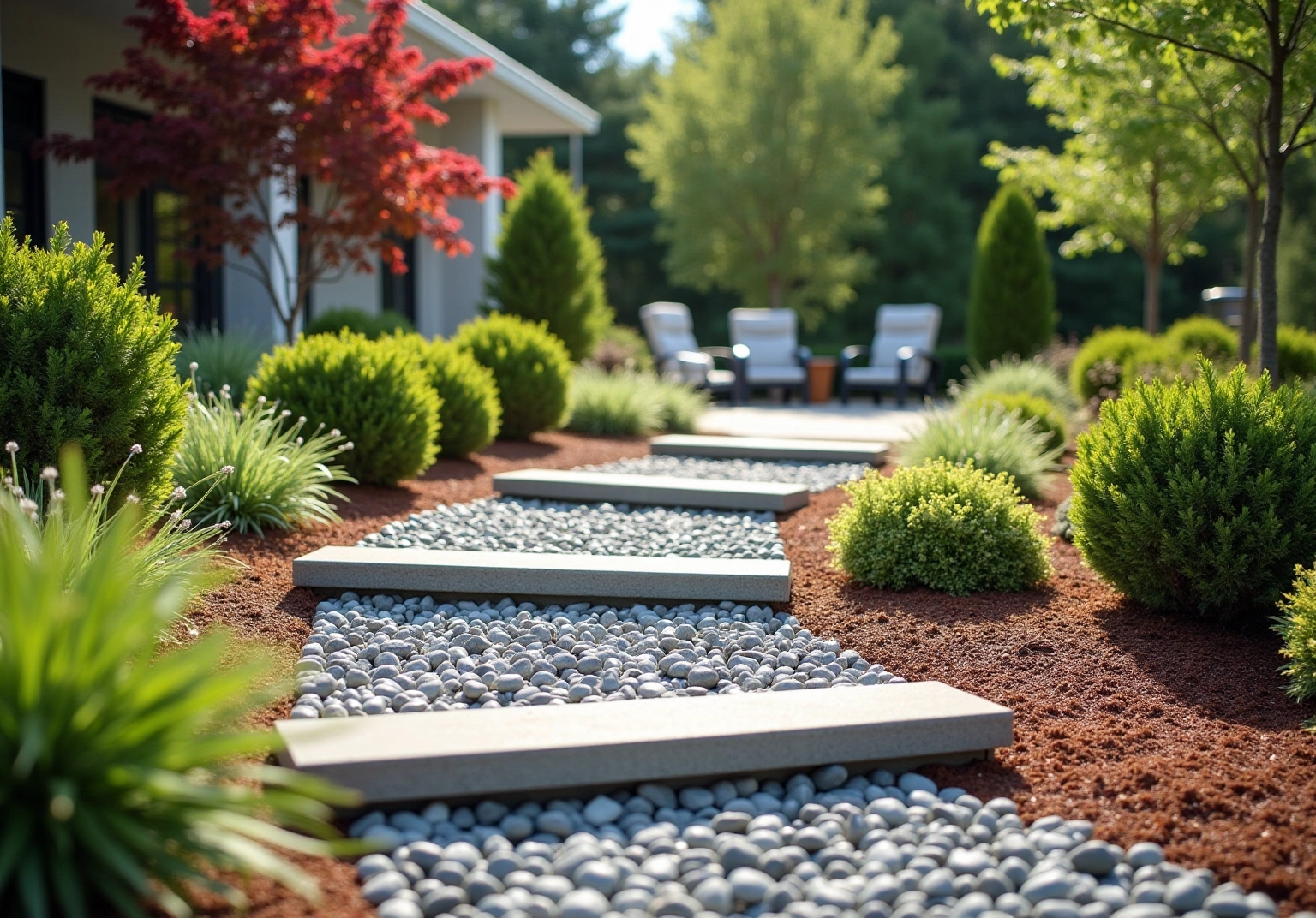
Conclusion
Choosing between mulch and rock for luxury landscaping requires a nuanced understanding of each material’s unique benefits and drawbacks. Mulch, with its organic roots, enhances soil health, retains moisture, and provides a lush aesthetic that can elevate property value. In contrast, rock offers durability, low maintenance, and a polished look that aligns well with contemporary design preferences. Ultimately, the decision hinges on personal style, maintenance preferences, and environmental considerations.
Key insights highlight that while mulch contributes to vibrant plant growth and soil enrichment, it necessitates regular upkeep and replacement. Conversely, rock presents a long-lasting solution that demands minimal maintenance, making it increasingly popular among homeowners seeking sustainable and aesthetically pleasing outdoor spaces. The choice between these materials should reflect individual lifestyles and the specific needs of the landscape, ensuring a perfect blend of beauty and functionality.
In conclusion, the landscape design choices made today will shape the outdoor environments of tomorrow. Embracing the advantages of both mulch and rock can lead to stunning results that enhance aesthetic appeal while promoting sustainability and ease of maintenance. As landscaping trends evolve, homeowners are encouraged to thoughtfully consider their options, balancing beauty with practicality to create luxurious outdoor spaces that truly reflect their vision.
Frequently Asked Questions
What are the main purposes of mulch in landscaping?
Mulch is primarily valued for retaining soil moisture, suppressing weeds, and enhancing soil health through decomposition. It is particularly beneficial for flower beds and around newly planted trees, promoting plant growth and reducing soil erosion.
How often does mulch need to be replaced?
Organic mulch typically requires replacement every 1-2 years, which is an important consideration for homeowners seeking low-maintenance solutions.
What are the benefits of using rock in landscaping?
Rock, including materials like gravel, river stones, and decorative pebbles, offers durability, low maintenance, and aesthetic versatility. It withstands severe weather conditions, rarely needs replacement, and can last over a decade without degrading.
How does rock affect weed growth?
Stones efficiently inhibit weed growth, providing a polished appearance that enhances the overall aesthetic of outdoor spaces.
What factors influence the choice between mulch and rock for landscaping?
The decision is influenced by cost, maintenance requirements, and visual preferences. Organic materials like mulch are generally more economical for larger areas, while stones can elevate the aesthetic appeal of upscale landscapes.
What are the advantages of mulch for luxury landscapes?
Mulch enhances visual appeal, retains soil moisture, inhibits weed growth, and enriches soil as it decomposes, promoting healthier plant growth. These benefits contribute to property value and curb appeal.
How does Grow Landscapes enhance the benefits of mulch?
Grow Landscapes integrates thoughtful design elements such as strategic lighting and comfortable seating areas, amplifying the overall appeal of the landscape while offering options like cedar mulch and recycled mulch for functional and aesthetic advantages.
Why is organic mulch considered essential in luxury landscapes?
Organic mulch is essential in luxury landscapes due to its ability to enhance aesthetics, support plant vitality, and reduce maintenance efforts, creating a stunning outdoor environment.



